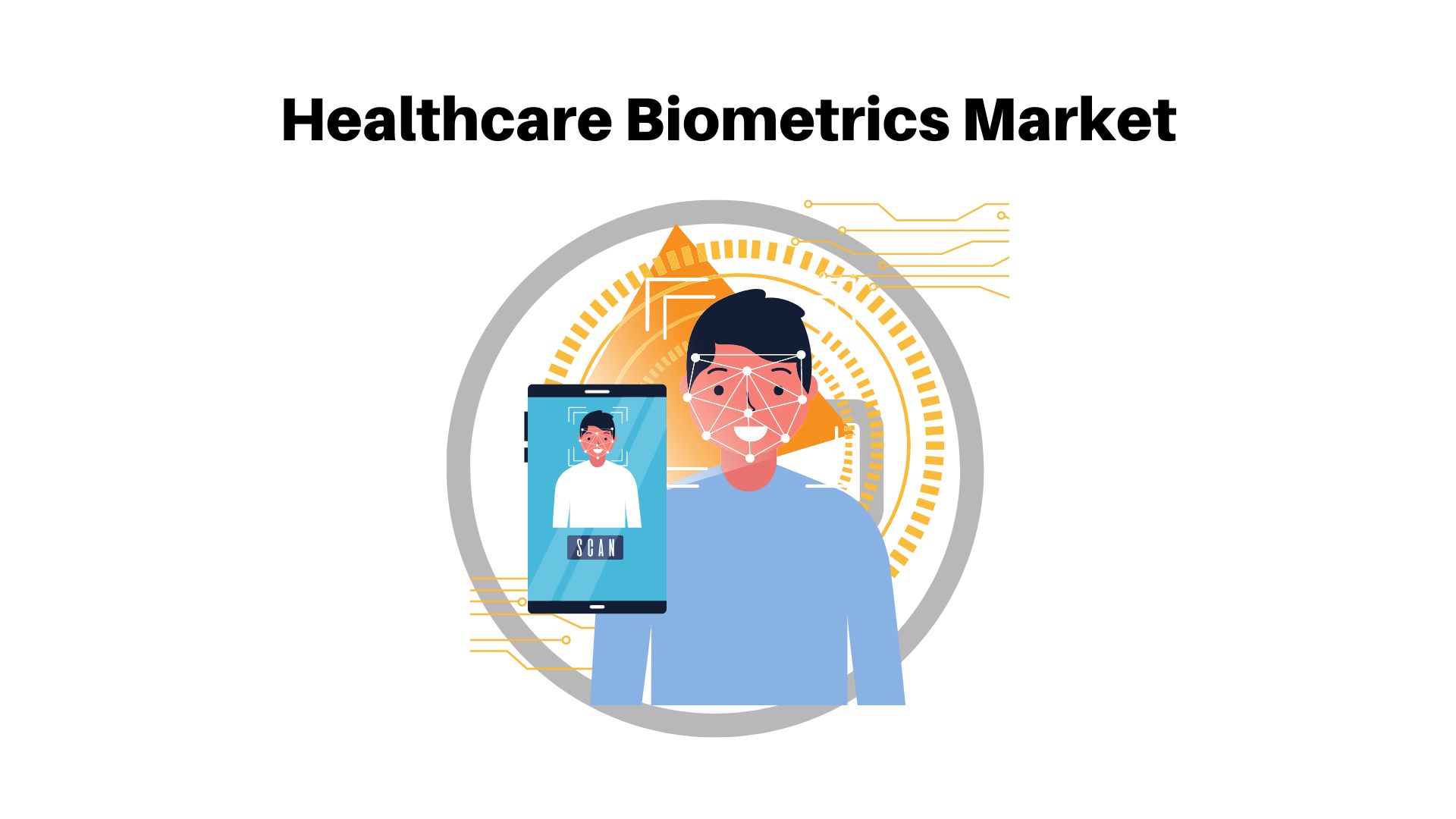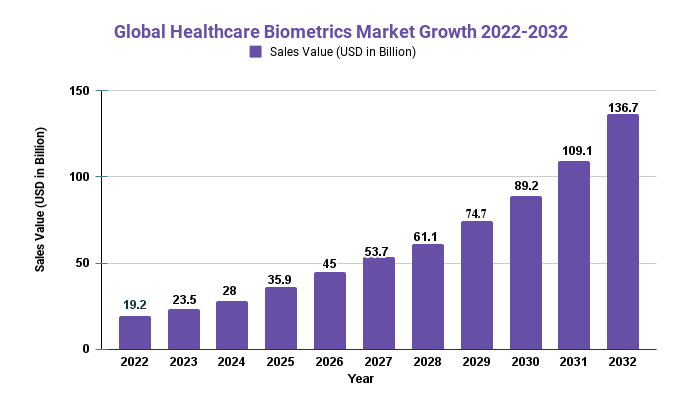Healthcare Biometrics Market to Reach USD 136.7 billion by 2032

Page Contents
The Healthcare Biometrics Market size is expected to be worth around USD 136.7 Bn by 2032 from USD 19.2 Bn in 2022, growing at a CAGR of 22.3% during the forecast period from 2022 to 2032.
The healthcare industry has been experiencing a rapid transformation in recent years, with the integration of technology playing a critical role. One of the most significant advancements has been the introduction of biometric systems into healthcare services. The Healthcare Biometrics Market refers to an innovative solution that utilizes unique human characteristics such as fingerprints, facial recognition, and iris scans to verify patients' identities and enhance security.
One of the key drivers for this market's growth is the increasing need for secure data access and protection. With cyber threats on the rise, medical facilities are turning to biometric authentication methods to provide an additional layer of security against data breaches. Moreover, biometric systems also help mitigate errors caused by manual identification processes while improving operational efficiencies.
Another factor driving the market growth is the increasing demand for remote patient monitoring solutions. With advances in telemedicine technology, patients can now receive care from their homes.

Key Takeaways
- Growing Demand, The healthcare biometrics market is witnessing tremendous growth due to factors such as rising security concerns, technological advancements, and an urgent need for streamlined patient identification and authentication.
- Applications Biometric technology is widely employed in healthcare for a range of tasks, such as patient identification, access control, medical record management, and drug dispensing.
- Biometric Modalities, Biometric modalities used in healthcare include fingerprint recognition, facial recognition, iris recognition, voice recognition, and others. Fingerprint recognition is the most frequently employed modality here.
- Healthcare Settings, Biometric technology is utilized in a variety of healthcare settings, such as hospitals, clinics, research laboratories, and pharmacies.
- Key Players, The healthcare biometrics market is highly competitive, with major players such as 3M Cogent Inc, BIO-key International, Fujitsu Limited, Superma Inc, Cenmetrix, HID Global, Hitachi, Integrated Biometrics, IriTech, LaserLock
Regional Analysis
North America has become the dominant region in the healthcare biometrics market due to the presence of major players, high healthcare expenditure, and government initiatives to promote biometric technology adoption. The United States leads this region followed by Canada.
Europe is expected to witness significant growth in the healthcare biometrics market due to the increasing adoption of electronic health records and government initiatives that promote its use. Key markets include the United Kingdom, Germany, France, and Italy.
The Asia-Pacific region is forecasted to be the fastest-growing region in the healthcare biometrics market due to the increasing adoption of healthcare IT solutions and the demand for advanced security systems within healthcare. China, India, Japan, and South Korea are key markets within this region.
The Latin American healthcare biometrics market is expected to experience moderate growth due to the rising demand for healthcare IT solutions and patient identification/authentication needs in the region. Brazil and Mexico are the key markets in Latin America.
The Middle East & Africa healthcare biometrics market is anticipated to experience moderate growth due to the increasing adoption of healthcare IT solutions and demand for advanced security systems in healthcare. Key markets in this region include United Arab Emirates, Saudi Arabia, and South Africa.
Overall, the healthcare biometrics market is projected to experience rapid expansion across all regions; North America boasts the largest share due to its early adoption of biometric technology in healthcare.
Drivers
Security Concerns Healthcare organizations are increasingly turning to biometric technology for enhanced security and fraud prevention. Biometric identification and authentication offer a high degree of precision when it comes to patient identification and authentication. Technological Advances, Biometric technology has seen rapid advancements in recent years, including the creation of new modalities and the integration of biometrics with other technologies like smart cards, mobile devices, and wearables. These developments have significantly accelerated biometric adoption within healthcare settings.
Need for Simplified Patient Identification and Authentication, Healthcare organizations face difficulties identifying and authenticating patients due to the absence of a standardized system. Biometric technology offers a secure, standardized way to identify and authenticate individuals, decreasing errors and improving patient safety. Increased Healthcare IT Adoption, With the rise of healthcare IT solutions such as electronic health records (EHRs) and health information exchange (HIE) systems, there has been a corresponding demand for biometric technology within healthcare. When integrated with these systems, biometric technology provides secure and efficient access control.
Government Initiatives, Governments around the world are advocating for biometric technology in healthcare to increase security and reduce fraudulence. For instance, in the U.S., regulations such as HIPAA (Health Insurance Portability and Accountability Act) and HITECH Act have been put in place to encourage the adoption of biometric technology within healthcare facilities. Growing Demand for Telemedicine, The COVID-19 pandemic has hastened the adoption of telemedicine, necessitating secure and efficient patient identification and authentication. Biometric technology can be utilized to strengthen telemedicine transactions' security while protecting patient privacy.
Restraints
The high cost of implementing biometric technology in healthcare can be a major deterrent to adoption. The price tag associated with purchasing devices and supporting infrastructure may be prohibitive for smaller healthcare organizations that lack sufficient budgets. Integration Challenges, Integrating biometric technology with existing healthcare IT systems can be a complex process that necessitates substantial investments of time and resources. This poses obstacles for healthcare organizations looking to adopt biometric technology. Data Security and Privacy Issues The use of biometric technology in healthcare raises security and privacy issues. Patients may be reluctant to share their biometric data with healthcare organizations due to uncertainty regarding its intended use and protection.
Lack of Standardization Unfortunately, there is a lack of uniformity when it comes to the application of biometric technology in healthcare, creating obstacles to interoperability and data exchange. This poses serious limitations on healthcare organizations' capacity to securely and efficiently share patient data. Regulatory Challenges Implementing biometric technology in healthcare must comply with regulations such as HIPAA and GDPR, which can prove complex and time-consuming for organizations looking to adopt this type of technology. Cultural Barriers, Cultural obstacles such as religious or social objections to biometric technology may prevent its adoption in certain regions and communities. Healthcare organizations should take into account these cultural stumbling blocks when implementing biometric technology.
Opportunities
Increased Adoption of Cloud-Based Solutions, Cloud-based biometric solutions provide several advantages, such as scalability, cost efficiency, and ease of deployment. With the increasing adoption of cloud-based solutions in healthcare, there is now a unique opportunity for biometric technology providers to offer cloud-based biometric solutions. Emerging Markets, Emerging regions such as Asia-Pacific and Latin America offer significant growth prospects for the healthcare biometrics market due to the increasing adoption of healthcare IT solutions and demand for advanced security systems within healthcare.
Mobile Biometrics, Mobile biometric solutions such as fingerprint and facial recognition technology offer healthcare organizations the security and efficiency of secure patient identification and authentication. These biometric systems can be integrated with existing healthcare IT systems and utilized in various settings, including telemedicine. Wearable Biometrics, Wearable biometric technology, such as smartwatches and fitness trackers, offers healthcare organizations a way to provide continuous patient monitoring and secure identification/authentication. This type of device can be integrated with existing IT systems in various healthcare settings.
Blockchain technology presents healthcare organizations with a unique opportunity to securely store and exchange biometric data. Blockchain provides a decentralized method for storing and sharing biometric information, decreasing the risk of data breaches or unauthorized access. Partnerships and Collaborations, Partnerships between biometric technology providers and healthcare organizations provide an opportunity to develop and implement innovative biometric solutions in healthcare. Such collaborations may result in new products or services tailored toward the specific requirements of healthcare organizations.
Challenges
Standardization, Lack of standardization in biometric technology, particularly with regard to data formats and algorithms, can lead to interoperability issues and prevent the exchange of biometric data across different healthcare systems and organizations. Privacy and security considerations, Biometric data is highly sensitive, necessitating a high level of security and privacy. Healthcare organizations must ensure they have appropriate measures in place to protect this sensitive data, while also informing patients about how their data is being used.
Integration with Legacy Systems Integrating biometric technology with legacy healthcare systems can be a complex endeavor that necessitates significant resources both in time and money. Therefore, healthcare organizations must guarantee that biometric technology can be seamlessly integrated with current IT systems. Cost Effectiveness Implementing biometric technology in healthcare can be expensive, especially for smaller healthcare organizations with tight budgets. Therefore, biometric technology providers must offer cost-effective solutions tailored to these organizations' individual requirements.
Cultural Barriers, Cultural barriers may prevent some regions and communities from adopting biometric technology. Healthcare organizations must be sensitive to these issues and take steps to address them. Regulatory Compliant Utilization, Utilizing biometric technology in healthcare must adhere to regulatory requirements such as HIPAA and GDPR. Healthcare organizations must guarantee they are adhering to these regulations, with adequate policies and procedures in place for protecting biometric data.
Recent Development
BioIntelliSense launched the medical-grade BioButton rechargeable wearable device in March 2022. Based on the configuration, the new BioButton Rechargeable device can provide continuous multi-parameter monitoring for a wide range of 20+ vital signs as well as physiologic biometrics for up to 30 days.
Mitsubishi Electric Corporation introduced HealthCam in January 2022. This facial recognition system can monitor an individual's heart rate, blood oxygen level, and temperature as well as other health indicators.
Report Scope
| Report Attribute | Details |
| The market size value in 2022 | USD 19.2 Bn |
| Revenue Forecast by 2032 | USD 136.7 Bn |
| Growth Rate | CAGR Of 22.3% |
| Regions Covered | North America, Europe, Asia Pacific, Latin America, and Middle East & Africa, and the Rest of the World |
| Historical Years | 2017-2022 |
| Base Year | 2022 |
| Estimated Year | 2023 |
| Short-Term Projection Year | 2028 |
| Long-Term Projected Year | 2032 |
Key Market Segments:
Type
- Face Recognition
- Iris Recognition
- Voice Recognition
- Fingerprint Recognition
Application
- Logical Access Control
- Physical Access Control
- Transaction Authentication
Key Market Players included in the report:
- 3M Cogent Inc
- BIO-key International
- Fujitsu Limited
- Superma Inc
- Cenmetrix
- HID Global
- Hitachi
- Integrated Biometrics
- IriTech
- LaserLock
Frequently Asked Questions
What is the market study period?
The Healthcare Biometrics Market is studied from 2017 – 2032.
What is the growth rate for the Healthcare Biometrics Market?
The Healthcare Biometrics Market is growing at a CAGR of 22.3%
Which region experiences the highest rate of growth in the Healthcare Biometrics Market?
Asia Pacific is growing at the highest CAGR over 2022- 2032.
Which region is the largest in the Healthcare Biometrics Market?
North America holds the highest share in 2022.
Who are the major players in the Healthcare Biometrics Market?
3M Cogent Inc, BIO-key International, Fujitsu Limited, Superma Inc, Cenmetrix, HID Global, Hitachi, Integrated Biometrics, IriTech, LaserLock
The team behind market.us, marketresearch.biz, market.biz and more. Our purpose is to keep our customers ahead of the game with regard to the markets. They may fluctuate up or down, but we will help you to stay ahead of the curve in these market fluctuations. Our consistent growth and ability to deliver in-depth analyses and market insight has engaged genuine market players. They have faith in us to offer the data and information they require to make balanced and decisive marketing decisions.